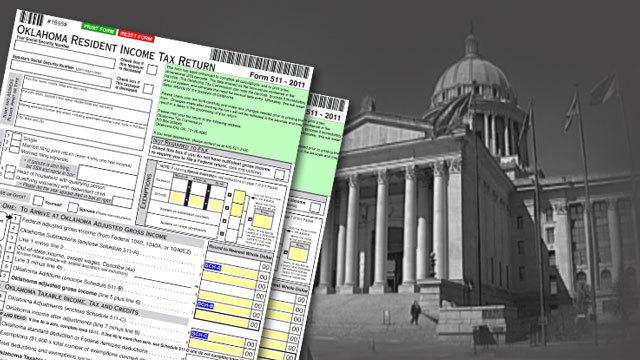A cut in the Oklahoma state income tax took a step toward reality when a state House subcommittee passed House Bill 3291, which would lower the personal income tax rate to 4 percent by 2018.
The approval of the tax-cut measure by the House Appropriations and Budget Subcommittee on Revenue and Taxation in Februrary came approximately one month after the state’s Office of Management and Enterprise Services reported tax collections have never been higher in Oklahoma. The state collected $7.86 billion in total taxes in Fiscal Year 2013, 37 percent more than the $5.73 billion collected 10 years earlier, as tax rates have been cut in the past decade. Much of the gain comes from greater sales tax revenues.
“This vote is a step toward empowering Oklahoma’s wage-earners. In Oklahoma we penalize many working men and women simply for having a job. This proposal would reduce our state’s penalty on work, increasing economic freedom for mothers and fathers, small business owners and job-creators across our state,” said Dave Bond, CEO of OCPA Impact, Inc., an organization that partners with the Oklahoma Council of Public Affairs and other organizations that promote pro-growth economic policies in the state.
Low Tax Rate, Higher Growth
“Over the past decade, Oklahoma has reduced its penalty on work by 25 percent. Yet tax collections and state government spending have been at record highs. Clearly, tax cuts have not depleted state revenues,” Bond said. “The evidence is strong, particularly when you also consider dynamics around the country, that low tax rates result in increased private-sector economic growth.”
Oklahoma’s top personal income tax rate was 7 percent in 2004 and has been gradually cut since then. It currently stands at 5.25 percent, approximately 25 percent lower than 10 years ago. The state also has raised the standard exemption and added a child tax credit.
Border State Competition
Tax competition appears to be the motivation. Oklahoma’s neighbor to the north—Kansas—is on track to have a 3.9 percent income tax rate in 2018. Oklahoma’s neighbor to the south—Texas—has no state income tax.
“As long as Oklahoma penalizes work by charging an income tax, and other states don’t, we will be at a disadvantage for bringing jobs and opportunity to our state,” said state Rep. Leslie Osborn (R-Mustang), author of HB 3291, to The Daily Ardmoreite newspaper in Ardmore, Okla. “With the dynamic changes Kansas is making, reducing taxes on families and small businesses, Oklahoma is in an income-tax sandwich between our neighbors to the north and south.”



